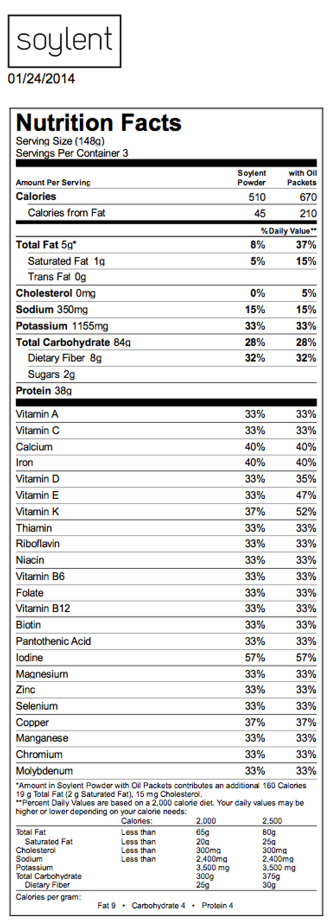In many dystopian future sci-fi books and movies it seems that mankind is doomed to eat nothing but sludge or to pop pills rather than enjoying actual meals. It’s appealing for the medium as a concept that is at once very futuristic and also somewhat alien but is it ever likely to happen?
Well if software engineer Rob Rhinehart has anything to say about it… then yes! After a successful crowdfunding campaign and investments from venture capitalists, Rob has begun selling the substance he calls ‘Soylent’ and which he hopes will have the potential to completely replace food in some cases when regular meals aren’t available. But what is it? Is it safe? And why on earth would you want to replace food?
What Is Soylent?
 Rob initially designed Soylent to meet his own desire for a quicker, cheaper and easier way to give his body the nutrients he needed. Rather than spend hours cooking food, preparing a meal and then washing up, he envisaged a single supplement that could replace the need for all of that provide his body with the sustenance it needed quickly and efficiently.
Rob initially designed Soylent to meet his own desire for a quicker, cheaper and easier way to give his body the nutrients he needed. Rather than spend hours cooking food, preparing a meal and then washing up, he envisaged a single supplement that could replace the need for all of that provide his body with the sustenance it needed quickly and efficiently.
With no background in nutrition, Rob set about researching his formula by reading websites, books and scientific papers before eventually coming up with his ‘Soylent’ mixture. The goal here was to provide a single shake that would provide all the nutrients a person needs in the ratios they’re needed – the equivalent of eating nothing but protein shakes, multivitamins, fibre and other supplements but all in the correct measurements.
He then proceeded to test the sludge on himself to refine it, before creating the crowdfunding campaign to gain publicity and funding. Now Rob and his team are taking orders for the supplement and enjoying a lot of media attention.
While this is by no means the first ‘meal replacement’, it is perhaps the first to gain such widespread interest and to be marketed to such a wide audience, which makes it an interesting and potentially transformative prospect. But is this a good thing?
The Vision
As a fellow software engineer it’s easy to see how the idea for Soylent might have come about. There is obvious application here for someone who is working towards a deadline and strapped for time, but who wants to avoid getting the shakes from a low blood-sugar level. This could also appeal to highly strung business types who don’t have time for lunch breaks or to single bachelors with a fear of cooking. For all these types, Soylent aims to be more readily available, but also to help encourage optimum nutrition through the addition of nootropics (‘smart’ supplements), antioxidants and other potent ingredients.
But the vision behind Soylent goes beyond that. The other big benefits are the product’s low cost, easy storage and easy transportation. Soylent doesn’t require refrigeration, and an order of one week’s worth of Soylent will cost you only $65 – or $3.10 per meal.
The cost is the thing that will potentially attract an even bigger market. Being so cheap makes Soylent a highly useful for anyone who is struggling to feed themselves – if they can afford a one-off up-front investment then they can buy themselves a month’s worth of Soylent and that way know that they and their family aren’t going to go hungry.
Better yet, Rob sees Soylent potentially helping people on the street – foreseeing a time when there’s a Soylent tap ‘right next to the water tap’. The ease of transport and lack of necessary refrigeration also means that Soylent could potentially be shipped to those in developing countries much more easily and in much greater quantities than traditional food. Soylent also places considerably less strain on the environment.
The Reality
So that’s the dream… but how does the reality stack up? Is Soylent a sensible alternative to regular food? Is it a viable solution for the hungry? Is it even safe?
At this stage it’s early to make any sweeping conclusions about Soylent, but there are definitely a few causes for concern.
For starters, it’s hard to imagine that any single supplement would ever provide a complete alternative to food and there are many factors that prevent this from being completely viable. There is an undeniable social element to eating and a lot of joy to be had from it even when you’re on your own. Put simply, eating nothing but sludge is no life and most people who have tried the ‘just Soylent’ experiment (except maybe Rob) will attest to this. Most people describe Soylent as tasting somewhat like protein shake, and as being rather foul smelling (and apparently it makes the people who eat it smelly too). Living off of just Soylent is a potentially depressing and unpleasant experience.
Further to this, the concept of a complete meal replacement ignores the fact that different people have different dietary requirements. While Soylent may be adequate for most people, it’s not going to be suitable for athletes and certainly not bodybuilders (Rob is a skinny dude…). Likewise someone with a particular allergy (though Rob says his aim was to make something completely ‘free’ from allergens…), particular religious beliefs, or diabetes will have problems with Soylent. Even men and women have different dietary requirements; and all these issues exist in developing countries just as they do here.
But then in Rob’s defence, he never suggested that Soylent be used as a complete replacement for your diet or that anyone live solely off of Soylent. In his words: ‘Soylent is a food, not a diet’. He acknowledges the different dietary requirements that exist and talks freely about the idea of variations of his product in future.
Other Issues
There are problems with the execution of Soylent too though. As a dietary supplement (rather than a food item), Soylent doesn’t need to undergo the same rigorous testing or meet the same standards as other things you eat. This may be why one reporter mentioned spotting rats at the company’s first factory (they have since moved) and seeing one batch of his Soylent develop mould. This lack of regulation is an issue with any dietary supplement, but when you are consuming so much of a supplement this issue can be magnified. If Soylent really is a ‘food, not a diet’ then it should be subject to the same standards. Rob is hoping to conduct more clinical trials which will be assessed by the Institutional Review Board (a board which looks at the ethics of biomedical and behavioural research) but whether this goes far enough is a question that is open to debate.
The ingredients are another issue that is open to debate. Many people are currently trying to develop their own Soylent alternatives, partly because they’re unhappy with the current content. Soylent is currently 50% carbohydrates, which should be not too different from most people’s diets but might not be ideal for someone dieting or bodybuilding. Furthermore, many people would probably be happier had the substance been produced by an actual nutritionist or biologist rather than a software engineer…
Conclusions
So with all that in mind, what do we think of Soylent? Well the first piece of advice is not to use it as a total replacement for food. That’s not the intended purpose and it’s really a recipe for disaster (pun intended). At the same time, it’s hard to endorse something 100% that effectively began life as a hobby and has not yet been subjected to proper long-term tests.
It’s also potentially an omen and telling of our times that anyone in developed countries should feel the need to turn to such a solution. In reality, if you feel like you don’t have time to even cook and eat properly, then there’s a very real chance that you have serious lifestyle issues that need to be addressed. If you are so overworked and so stressed that you consider eating an inconvenience… then maybe changing careers is a better solution for you.
On the other hand, the project definitely raises some important questions and does have potential uses. It will certainly appeal to some people (whether or not it should) and as a potential answer for people who can’t afford to eat healthily it has real merit. Even as a corrective tool for those with unhealthy diets, the ability to quickly tailor and produce Soylent could be a great help.
So no, you can’t stop eating food just yet and you probably never should. More testing is definitely needed and a lot of tweaking – but if Rob and his team continue to approach the idea of Soylent with the right attitude then it’s definitely something to put in your ‘one to watch’ column.




